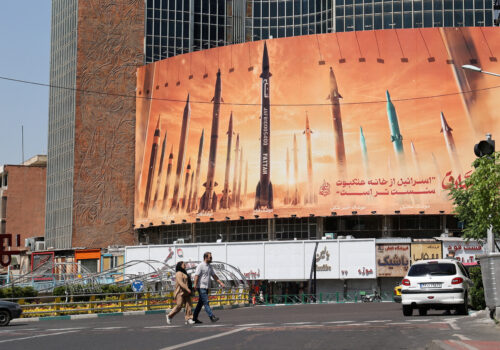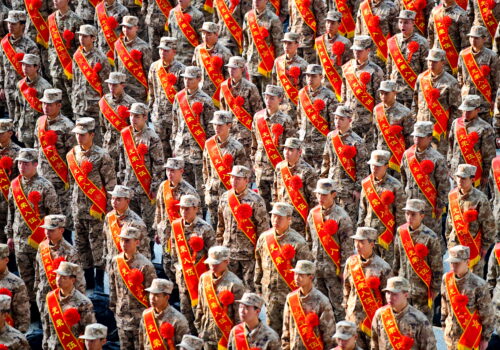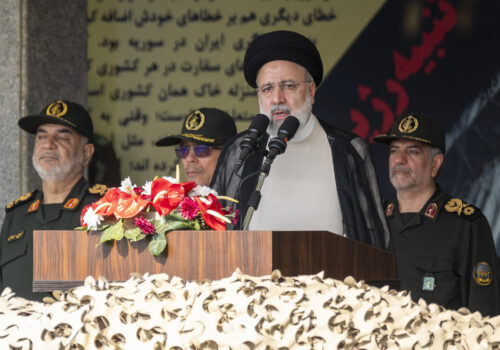Why Taiwan stands with Israel
“Israel Alone,” blared the Economist’s cover story in late March. This sentiment resonated deeply with Israelis. Since Hamas’s devastating attack on October 7, the fight to free hostages and defend itself from vicious terrorism feels like a solitary battle.
Six months into the conflict, 133 Israeli hostages still languish in Gaza, tens of thousands of Palestinians have perished, and the humanitarian situation in the Gaza Strip worsens by the day. Hamas has suffered major setbacks but remains entrenched.
Iran’s unprecedented April 13 attack on Israel, which included more than three hundred drones and missiles, saw Israel’s supporters rise up in its defense—both militarily and in the court of public opinion. But six months have taught Israel that sympathy can be fleeting. Global solidarity waned in the aftermath of the October 7 massacre, and it will likely do so again. Jerusalem’s staunchest allies will likely dither once more in their support as domestic pressure mounts to, for example, tie arms sales to a ceasefire and treat Israel as a pariah.
But Israel is not alone. It has found support in unexpected places.
“We condemn the Hamas terrorist attack and stand in solidarity with Israel. Our position hasn’t changed,” Taiwanese Foreign Minister Joseph Wu told me in a March meeting with Israeli academics in Taipei. The visit was supported by the Ministry of Foreign Affairs of the Republic of China (Taiwan).
Wu, Taiwanese President Tsai Ing-wen, and the incoming president, Lai Ching-te, were among the first world leaders to condemn the terrorist attack and express their support for Israel. At Wu’s request, Taiwan’s tallest skyscraper, Taipei 101, was lit in the colors of Israel’s flag on October 12, 2023.
After the April 13 attack, Taiwan was quick to condemn Iran. On April 15, Tsai met with a delegation of Knesset members led by Boaz Toporovsky, the head of the Israel-Taiwan interparliamentary friendship group.
During the meeting, Tsai conveyed heartfelt condolences and solidarity to the delegation. “During these horrible times, Israel saw and will always remember Taiwan’s support,” said Toporovsky.
Support from Taipei goes beyond words. Taiwan’s appointee in Tel Aviv and de facto ambassador, Abby Lee, has been busy aiding hostage families, adopting the most affected kibbutzim in southern Israel, and volunteering with farmers.
Taiwan recently pledged more than half a million dollars to Israel for critical initiatives, including medical and communications supplies for local municipalities. This follows earlier aid from Taiwan to an organization helping Israeli soldiers and families immediately after the October 7 attack.
In April, Member of Knesset Efrat Rayten visited northern villages, highlighting the plight of one hundred thousand Israelis still displaced by the war in fear of attack by Iran-backed terrorist groups. Rayten criticized the Netanyahu government’s inaction, lamenting, “It’s disheartening that the only person who joined me was Taiwan’s representative in Israel. She came to help.”
Understanding Taiwan’s alignment with Israel
Why is it that while the world appears to be turning away from Israel, Taiwan’s commitment only deepens?
In many ways, Taiwan sees a reflection of itself in Israel—two vibrant democracies facing threats from hostile neighbors. Both nations wield substantial economic and technological prowess, and both heavily depend on US military exports and diplomacy.
Taipei also sees Israel as a “role model” for what Taiwan should aspire to be, citing its unwavering determination and capabilities to defend itself. Less than a week after October 7, Taiwan’s national defense ministry appointed a task force to glean lessons from the war in Gaza.
China claims the autonomous island as its own and has been aggressively lobbying Taiwan’s remaining allies to cut diplomatic ties with the island. In January, Nauru became the latest country to succumb to Beijing’s unmatched economic incentives, reducing Taiwan’s formal partners to twelve. With its backers dwindling and China flexing its muscles across the Strait, Taiwan seeks to demonstrate that it, too, is not alone.
On a deeper level, Taiwanese leaders seem to view Israel’s war with Hamas and Iran as an extension of a greater struggle between democracy and autocracy. Wu explained in March that Taiwan’s steadfast support extends to all “like-minded partners” who uphold shared principles of freedom, democracy, and the defense of human rights.
The “unholy alliance” between Chinese leader Xi Jinping and Russian President Vladimir Putin has brought Beijing and Moscow closer than they had been in decades. The two strongmen share a vision of a post-Western world order in which irredentist superpowers can invade their smaller neighbors with impunity. Unsurprisingly, Beijing and Moscow failed to condemn Hamas and justified Iran’s unprecedented attack at the United Nations Security Council.
In stark contrast to Taiwan, China has been going above and beyond to demonize the Jewish State in international forums and to advocate for Hamas terrorism as a “legitimate struggle.” The party-state paints a picture of the United States’ “single-handed” military and diplomatic support for a “vicious,” Hitlerian Israel. In doing so, it seeks to fuel anti-Western and anti-liberal sentiments in the Global South.
Furthermore, China uses explicit parallels between Xinjiang and Gaza to demonstrate that Western criticism of Chinese human rights violations and its undermining of the “rules-based international order” is hypocritical.
On April 22, the US State Department issued its annual human rights report, accusing China of “genocide, crimes against humanity, forced labor, and other human rights violations” in Xinjiang. The next day, Wang Wenbin, a spokesperson for the Chinese Foreign Ministry, used Beijing’s preferred tactics of deflection and whataboutism. “The US, turning a blind eye to over 110,000 civilian casualties in Gaza”—more than tripling the casualties reported by the Hamas-controlled Gaza Health Ministry—adding, “That alone says enough about how little human rights actually mean to the US and how it tramples on them.”
If roles are reversed
The heat and pressure of recent crisis have forged relations between Israel and Taiwan. But both will need to take additional steps to make the most of this partnership.
To begin with, Israel must take a firmer stance against China’s support for Hamas and Iran-backed terrorism, exposing the hypocrisy and repression that underpin its vision for a new global order.
Israel could, for example, openly and vehemently reject any purported peace “initiatives,” “position papers,” or “new security architecture for the Middle East” put forth by China. These initiatives are often designed to portray China as a neutral, responsible major power and as an alternative to the US-led international order. Israel should highlight China as a biased and opportunistic actor that is “appreciated” by Hamas, the Muslim Brotherhood, and Iran, underscoring why countries such as Egypt and those in the Gulf should be cautious about turning to China for their security.
This is not to say that Israel should renounce its recognition of the People’s Republic of China in favor of Taiwan. China, as the world’s second-largest economy and a manufacturing powerhouse, will remain one of Israel’s top trading partners. With China’s economic presence in the Middle East and North Africa expanding, more engagement is unavoidable.
Moreover, rather than viewing Taiwan narrowly through the lens of mainland China, Israelis and other like-minded partners should strive to appreciate Taiwan on its own terms for its unique characteristics and global contributions. In a world where freedom and democracy are under threat, Taiwan serves as a beacon of democratic values and effective governance.
Shared values are an important foundation, but in the long run, Taiwan’s relations with like-minded partners will need to be based on their strategic national interests. How might Israel and Taiwan enhance their mutual interests? Enhancing economic cooperation is an obvious answer, as are other “soft” areas of people-to-people engagement that Beijing cannot deny, including academia, media, business, culture, and tourism.
Mutual interests are further magnified by geopolitics and the restructuring of global supply chains. Taiwan, a pivotal player in semiconductor manufacturing, and Israel, renowned for chip design, hold great potential for “friendshoring” initiatives to create more resilient global supply chains.
Taiwan and Israel should both take great care to strike a balance between symbolism and substance. While opposing Chinese repression and advancing common values are commendable, it is more important for Israel to draw on its civil defense expertise to assist Taiwan in deterring a Chinese attack or blockade of the island, which would cost the global economy trillions of dollars.
In times of crisis and encroaching authoritarianism, Taiwan has demonstrated its willingness and mettle to help like-minded partners fight back. In the event that the roles are reversed, it is imperative that Israel and other US allies do the same.
Tuvia Gering is a researcher at the Diane and Guilford Glazer Israel-China Policy Center at the Institute for National Security Studies (INSS) in Tel Aviv, and a non-resident scholar at the Atlantic Council’s Global China Hub. Gering is also a reservist in the Israel Defense Forces. Follow him on X @geringtuvia.
Further reading
Fri, Apr 19, 2024
Are Israel and Iran stepping back from the brink?
Fast Thinking By
With an all-out war hanging in the balance, will these two foes now stand down? Our experts are here to interpret the signals.
Tue, Mar 19, 2024
There will be no ‘short, sharp’ war. A fight between the US and China would likely go on for years.
New Atlanticist By Brian Kerg
US policymakers and military leaders must rigorously study and plan for a broad range of implications from a years-long war against China.
Fri, Apr 19, 2024
Experts react: Israel just conducted a limited strike in Iran. Is this the end of the tit for tat?
New Atlanticist By
The strike early Friday near the Isfahan air base and nuclear site is an apparent retaliation against Iran’s attack on Israel on April 13.
Image: President Tsai Ing-wen meets with a delegation of Israeli Knesset members. April 15, 2024. Photo by Simon Liu / Office of the President.


